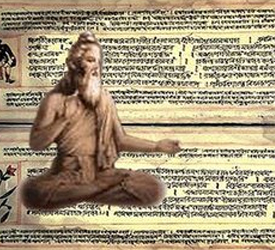Vedo Rakshati Rakshitaha

Vedic Concepts
Veda is divided into four major parts viz, Samhitas (prayers), Brahmanas (rituals), Aranyakas ( meditations) and Upanishads (The knowledge of self). The first three (Samhita, Brahmana & Aranyaka) are collectively called as Veda Purva (Starting) and the last one Upanishad is called as Veda Anta (ending) or Vedanta. The Veda Purva is also referred as Karma Kanda (Portion dealing with Rituals & Activities) and Vedanta as Jnana Kanda (Portion dealing with The Knowledge of Supreme Self).
Vedic Science
Vedic science is the term used in modern attempts to systematize ancient scientific thought to be found in early Indian scriptures, especially the Vedas.
Science rests upon a definition of what constitutes the right means of knowledge through which something can be known. Science, like the classical philosophies of India, recognizes the validity of sensory perception and reason as the main means at our ordinary disposal for gaining authentic knowledge about the world and about ourselves.
Vedic science recognizes the importance of sensory perception and reason, it considers that there is another, more reliable and internal source of knowledge, particularly necessary for understanding the inner or spiritual world. This is the direct perception of the silent or meditative mind.
Vedic Sciences include both subtle or occult sciences like astrology and the inner science of Self-knowledge through Yoga and Vedanta. Yet it sees all sciences as related. All knowledge is ultimately self-knowledge. Our true self is not merely the human or psychological self but the universal Self. Each one of us is a unique manifestation of the universal consciousness, a human embodiment of it, but our true being is one with the entire universe, with all beings, and ultimately with the Absolute beyond all time and space (Parabrahman). The key even to understanding medicine or physics is to look at the forces of the universe as existing both within and around us as powers of consciousness – to our true being in the universe and the entire universe within ourselves.
Real science consists of an objective pursuit of truth through observation and experimentation. It occurs apart from any beliefs or preconceptions about what it is going to find. It is based upon reason and direct perception, in which the reality is allowed to reveal itself to the unbiased eye.
However, the universe we live in is a multidimensional reality from the subatomic to the supragalactic in the realm of physics alone. Biology, medicine, psychology and the social sciences require different perspectives and approaches to deal with appropriately. On top of these are subtle forces and influences, extrasensory, occult and spiritual that many people claim to experience as well and have developed special methods of working with.
Besides any knowledge of the external world is the knowledge of the internal world, the perennial quest for Self-knowledge or knowledge of our true nature, as evidenced by the most primary and important of all life’s many questions, “Who am I.” This inner quest or inner science can be very different in approach than the outer sciences.
From an Indian perspective, we can call this inner science of Self-knowledge, ‘yogic science’. Traditional Yoga and Vedanta also has its goal as the objective pursuit of truth. But it aims at the supreme truth – which is the eternal – that truth which never changes. It regards relative truths – up to and including the very existence of the external world itself – as ultimately an illusion because these eventually, at one time or level or another, are found not to be valid. This yogic science aims not just at the knowledge of the world but an understanding of Knower.
Veda itself means knowledge, deriving from the Sanskrit root ‘vid’ meaning to know, to see or to cognize. The Vedas are called Vidyas which means ways of knowledge or perception (a term cognate with Latin video!). The Vedas we might say are the Vidyas or videos of the sages shown on the inner screen of the meditative mind. They were said to have been cognized by the human mind in tune with the universal Being or Brahman.
The Vedas address all aspects of existence through Dharma, the natural laws that uphold the universe, which reflect not only matter and energy but life, mind and consciousness. As such, the Vedas constitute what could be called a science in the modern sense of the word and much more. We can find among the Vedic sciences a whole range of sciences from astronomy and chemistry to psychology and surgery, extending to astrology and to the science of Yoga itself. We can call this integral approach to both the spiritual and material sciences as ‘Vedic science.’
